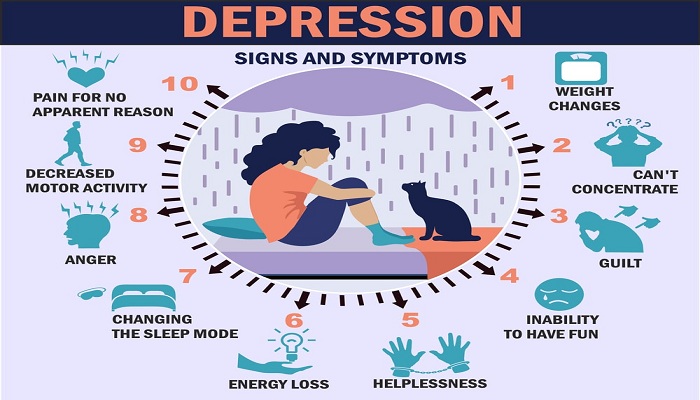Understanding Depression

Understanding Depression
Published On: 13-09-2024 | 4 min Read
Understanding Depression and Seeking Help is a topic that delves into the complexities of depression, a mental health condition characterized by persistent feelings of sadness, hopelessness, and a loss of interest in activities. This topic aims to educate individuals on the signs and symptoms of depression, its causes and risk factors, and the importance of seeking professional help. It also explores ways to break the stigma surrounding mental health, provides resources for seeking support, and offers practical strategies for managing depression and supporting loved ones affected by the condition. By understanding depression and seeking help, individuals can take the first steps towards recovery and regaining control over their mental wellbeing.
Recognizing the Signs, Symptoms, and How to Seek Help
"Depression is not something that you can simply 'snap out' of. It's a serious mental health condition that requires treatment and support."- David Kessler
Depression is often described as an invisible illness, one that quietly but persistently drains the joy and vitality out of life. Unlike a physical wound, it doesn’t show on the outside, making it hard for others to see or understand. Yet, it’s a very real and serious condition that affects millions of people worldwide.
What is Depression?
Depression is more than just a bout of the blues or a temporary feeling of sadness. It is a mood disorder that profoundly impacts how you feel, think, and handle daily activities. From struggling to get out of bed in the morning to feeling a constant sense of hopelessness, depression can make even the simplest tasks feel insurmountable.
Recognizing the Signs and Symptoms:
Understanding the signs and symptoms of depression is crucial for early intervention and effective treatment. While everyone’s experience with depression is unique, some common symptoms include:
Persistent Sadness:
A deep sense of sadness or emptiness that doesn’t go away, even when circumstances improve.
Loss of Interest:
A noticeable lack of interest or pleasure in activities that were once enjoyable, such as hobbies, socializing, or work.
Fatigue:
Constantly feeling tired or drained, even after adequate rest. Depression can sap your energy, making even small tasks feel exhausting.
Changes in Appetite or Weight:
Significant weight loss or gain not related to dieting. Depression can cause either a lack of appetite or an increase in cravings.
Sleep Disturbances:
Difficulty falling asleep, staying asleep, or sleeping too much. Insomnia and oversleeping are both common in people with depression.
Difficulty Concentrating:
Struggling to focus, make decisions, or remember details. This can affect work, school, and personal relationships.
Feelings of Worthlessness or Guilt:
Unjustified feelings of guilt or a sense of worthlessness can accompany depression, often leading to self-criticism and a harsh inner dialogue.
Thoughts of Death or Suicide:
In severe cases, depression can lead to thoughts of death or suicide. This is a serious symptom that requires immediate attention and intervention.
How to Seek Help
If you recognize these symptoms in yourself or a loved one, it’s important to seek help as soon as possible. Depression is a treatable condition, and early intervention can make a significant difference in recovery. Here are some steps you can take:
Talk to a Healthcare Provider:
Your primary care doctor or a mental health professional can provide an initial assessment and guide you toward the appropriate treatment. This may include therapy, medication, or a combination of both.
Reach Out to Support Networks:
Whether it’s friends, family, or a support group, having people to talk to and lean on is crucial. They can offer encouragement and help you navigate your treatment journey.
Consider Therapy:
Different types of therapy, such as cognitive-behavioral therapy (CBT) or interpersonal therapy (IPT), have been proven effective in treating depression. A therapist can help you understand your thoughts and behaviors, and develop strategies to manage them.
Medication:
In some cases, antidepressant medication may be recommended. These medications can help balance chemicals in your brain that affect mood and emotions. It’s important to discuss the potential benefits and side effects with your doctor.
Lifestyle Changes:
Regular exercise, a healthy diet, and sufficient sleep can play a significant role in managing depression. Mindfulness practices, such as meditation and yoga, can also be beneficial.
Emergency Help:
If you or someone you know is having thoughts of suicide, it’s critical to seek immediate help. Contact emergency services, a crisis hotline, or go to the nearest emergency room.
Conclusion
Depression is not a sign of weakness, nor is it something you can simply “snap out of.” It is a medical condition that requires attention and care. By recognizing the signs and seeking help, you can take the first step towards recovery and reclaim your life. Remember, reaching out for help is a sign of strength, not weakness, and it can make all the difference in overcoming this challenging condition.
